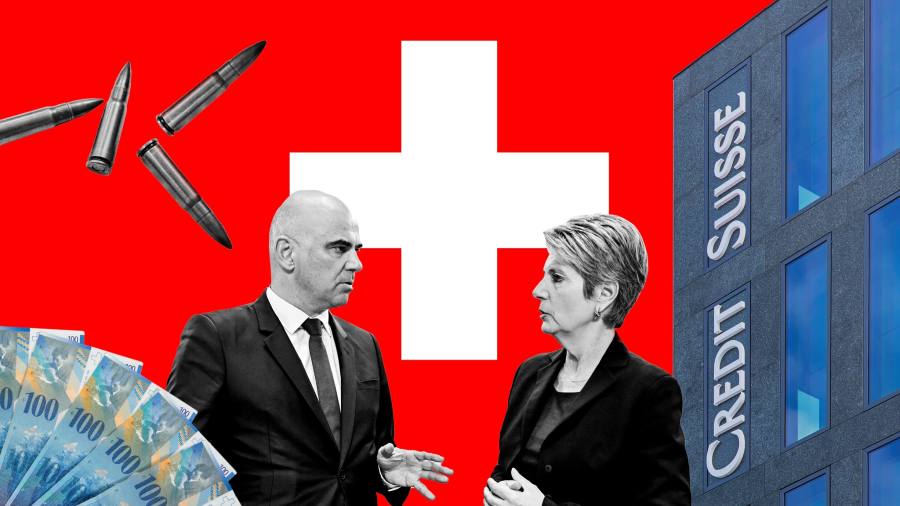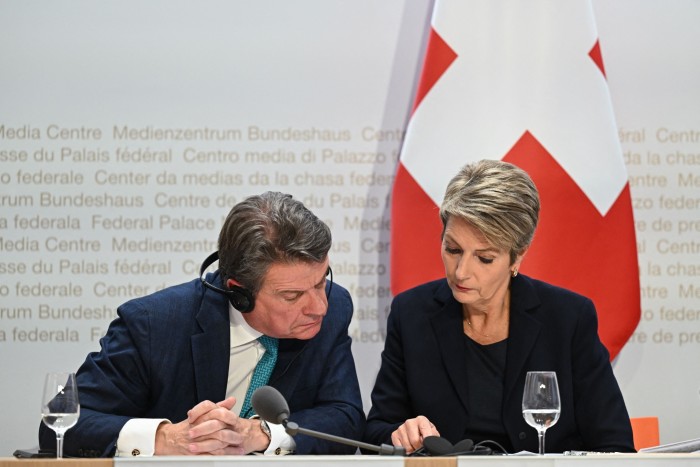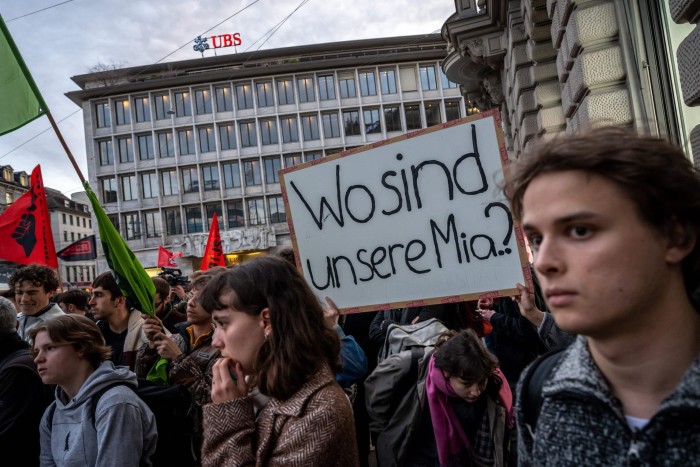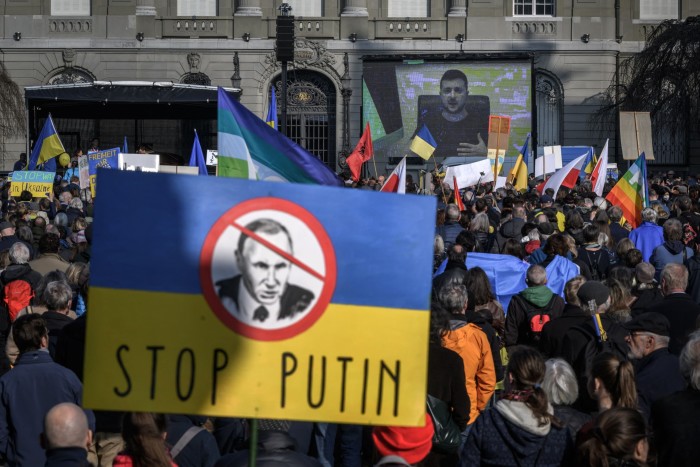
“No one becomes a murderer more easily than a fatherland,” wrote Friedrich Dürrenmatt, Switzerland’s national playwright.
Last weekend, the country killed one of its own. At a hastily convened press conference in the capital Bern on Sunday evening, the government and regulators announced Credit Suisse’s 167-year run as one of the pillars of Swiss society was over. The huge bank, the locomotive of Switzerland’s industrial miracle, weakened by years of scandal, was to be folded into its bigger rival UBS.
The talk was of staving off an unthinkable financial collapse. There was little time for sentiment. The government “regrets Credit Suisse wasn’t able to master its own difficulties,” said Karin Keller-Sutter, Switzerland’s finance minister.
At the home of the deceased, a single candle flickered in the dawn breeze on Monday morning with a small bunch of flowers beside it — tokens of mourning placed to one side of the entrance to the Lichthof, Credit Suisse’s grand headquarters on Paradeplatz in Zurich.
Over the previous 72 hours, technocrats, bankers and regulators in the capital had shuttled in and out of the Bernerhof — the office of the finance ministry, high on an escarpment above the river Aare — to finesse a solution. But they were working within a strict brief: the state was not going to use taxpayer money to preserve the bank’s independence. The deal shocked many around the world and raised questions about the stability the Swiss system sells itself on.
Normally in times of international economic stress, Switzerland is a haven: however, as gold and the Japanese yen rose against other assets this week, currency traders ditched the franc at the fastest pace in two years.

But the country’s current problems are not merely financial. “Switzerland is in the most serious crisis since the second world war,” the US ambassador to Bern Scott Miller said just earlier this month: Russia’s brutal invasion of Ukraine, he contended in an interview with the newspaper NZZ, has put paid to the myth of Swiss neutrality.
For months now, Switzerland’s neighbours and closest economic partners have been increasing the pressure on Bern over its steadfast refusal to be a part of any military help for Kyiv. The lobbying is becoming rancorous.
“Neutrality has helped the Swiss for centuries on this war-torn continent. But it doesn’t work anymore,” says Thomas Borer, the former Swiss diplomat who wrote the country’s current neutrality policy. Switzerland is now surrounded by friends, he says, and deeply enmeshed with them economically.
“If you are neutral, it’s like going to a funeral, everyone is crying and you are standing around saying what’s the issue? No one likes you.”
With two of the key facets of Swiss identity — its role as the world’s banker, reinforced by its geopolitical impartiality — in question, “We are in a perfect storm,” Borer says. “We have a lot of soul searching to do.”
Centre of banking
Even as the crisis on Paradeplatz reverberates, there is so far little evidence to suggest that Switzerland’s other top-tier banks — which cater to the world’s super-rich — will suffer.
Quite the contrary: many are now eagerly picking over the bones of their rival, looking to hire talented employees and poach lucrative clients. Julius Baer, formerly Switzerland’s third-largest bank by assets, and now its second, saw its share price rise 13 per cent this week.
“This is a very unfortunate situation, there is no doubt about it. But from my perspective, it’s not so pessimistic,” says Hubert Keller, the senior managing partner of Lombard Odier, one of Switzerland’s oldest lenders.
“The strength of Switzerland as a financial place in the world has been built over decades and centuries. We are still the number one centre for cross-border wealth management.”
Keller points to the doubts many had about Switzerland’s future when its banking secrecy was challenged after the financial crash of 2008. (Swiss banks now share skeleton information on foreign clients’ assets with foreign regulators, to prevent tax fraud). “Competitors abroad thought Swiss banking would not last after that, but they were proved wrong.”
For Keller, and many others in Switzerland, Credit Suisse’s problems ultimately stemmed from it becoming less “Swiss” — its push abroad and failed embrace of a foreign banking culture, emulating rivals on Wall Street by pursuing higher risks and higher returns.
“Credit Suisse found itself playing in a different league and sometimes they played very badly,” says Mark Pieth, a legal scholar and founder of the Basel Institute on Governance. “In investment banking they were amateurs.”
But concerns overseas may not be the sole worry for the banking sector. Credit Suisse is a part of Switzerland’s modern national identity story. And with general elections in October, the banking industry has become a political concern.
For the rightwing populist Swiss People’s Party (SVP) — the largest in the country’s federal assembly — the bank’s decline, and the to-them-scandalous rescue that collapses it into UBS, are symptoms of subservience to foreign interests.

But for the left-leaning Social Democratic Party (SP), the second largest, it is a tale of inadequate regulation and greed. “We have been trying to have clear and stricter regulations for years, but the rightwing liberal majority in parliament has always refused that,” says Cédric Wermuth, the party’s co-president. “In general we have to recognise that the liberal mainstream thesis of rational financial markets has been again proven to be rubbish.”
The collapse of Credit Suisse could be a turning point, he suggests. “We are witnessing the moment where the financial sector that has been a huge benefit to Switzerland has become a huge liability. In the past, global crises have helped Switzerland strengthen its model — we were a safe haven. War or crisis, whatever happened, you could bring your money here. That didn’t change in 2008, but maybe it has changed this [week] at a very fundamental level.”
The question of neutrality
Banking is not the only area where long-established Swiss values are suddenly in question.
Switzerland’s doctrine of neutrality has been the cornerstone of its foreign policy for centuries, and it has not participated in a war since 1815. But that position has become harder to maintain in an era of European unification and economic interdependency.
“The question over just what neutrality means was always there, in the background,” says Michael Ambühl, former state secretary of foreign affairs. “But it has come out to the forefront due to this war in Ukraine — and it’s obvious both to the political class and society that we need to clarify it.”
At the sharp end of the issue is a question over arms deliveries: Swiss-made weapons exported to neighbours years ago now require permission from Bern to be re-exported.

For months, Bern has refused to allow countries such as Germany to send its mothballed stockpiles of Swiss ammunition to Kyiv. Berlin’s frustration has grown, and other Nato members have ratcheted up the pressure. The message from US ambassador Miller earlier this month was the strongest signal to Switzerland yet.
Polls show a majority of Swiss — 55 per cent — support the re-export of arms. But politicians are sharply divided. And by constitutional design, nothing in Switzerland changes without consensus. The SVP is campaigning hard on the issue as a matter that goes to the core of what it means to be Swiss.
What makes matters peculiar, however, is that Bern has so far matched all of the EU’s economic sanctions against Russia. Indeed, Switzerland was one of the first countries Moscow put on its official list of “unfriendly” nations last year.
Bankers meanwhile warn that clients from certain countries — China foremost among them — are increasingly nervous about leaving their assets in Switzerland. That leaves the country with all the downsides of neutrality and fewer and fewer of the upsides, says one.
“Neutrality is in our books and in our genes, but that doesn’t mean we mustn’t adapt,” says Borer. “We have to.”
Adapt or decline
Those worried about the national character eroding have no shortage of metaphors to point to.
Earlier this month, Switzerland lost an appeal in US courts to give its iconic Gruyère cheese — from the valley of the same name in canton Fribourg — protected geographical status.
Bars of Toblerone chocolate will no longer display the Matterhorn on its packaging after Mondelez, the global food company, announced it would move the manufacture of them from Switzerland to Slovakia.
Even the cherished national sport is suffering. This winter the Swiss Alps had some of the thinnest snowfall on record, with some of its slopes covered in mud and dead grass in the middle of January.
As with Credit Suisse, and as with neutrality, the common thread may be one of how “Swissness” either accommodates a rapidly changing world, or loses its purchase.

Credit Suisse was one point of fracture, but there may be others, says Pieth. He points to the huge number of secretive commodity traders based in Switzerland that seem to operate as laws unto themselves. “Switzerland cannot go on operating under the radar,” he believes.
And yet over years of fierce independence, the country and its model have proved nothing if not resilient.
“The media and [its] contemporaries tend to overestimate the news,” says the Swiss historian Thomas Maissen. “In the autumn of 2001, we had 9/11, a rampage in Zug with 14 politicians murdered, a fire disaster in the Gotthard car tunnel, the crash of a Crossair plane and the grounding of Swissair.”
The airline’s bankruptcy that October “was interpreted as the symbolic end of an era — of peaceful and successful Switzerland”.
Breathless features pondered the demise or slow decline of the nation. The opposite proved true. Switzerland’s freedom and safety endured, and its wealth grew: the Swiss economy, with a GDP of over $800bn annually, is more than twice as large now as it was then.
But if there’s a lesson in the debate surrounding the Ukraine war, says Ambühl, it’s that clinging to old certainties while the world is changing risks leaving Switzerland behind. “We have to adapt to new realities.”
Banks in turmoil
The global banking system has been rocked by the collapse of Silicon Valley Bank and Signature Bank and the last minute rescue of Credit Suisse by UBS. Check out the latest analysis and comment here

